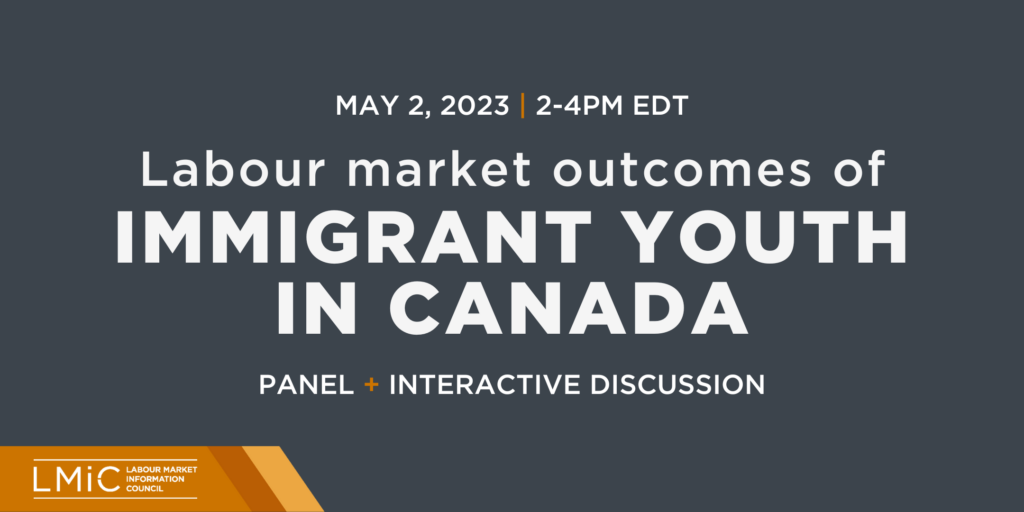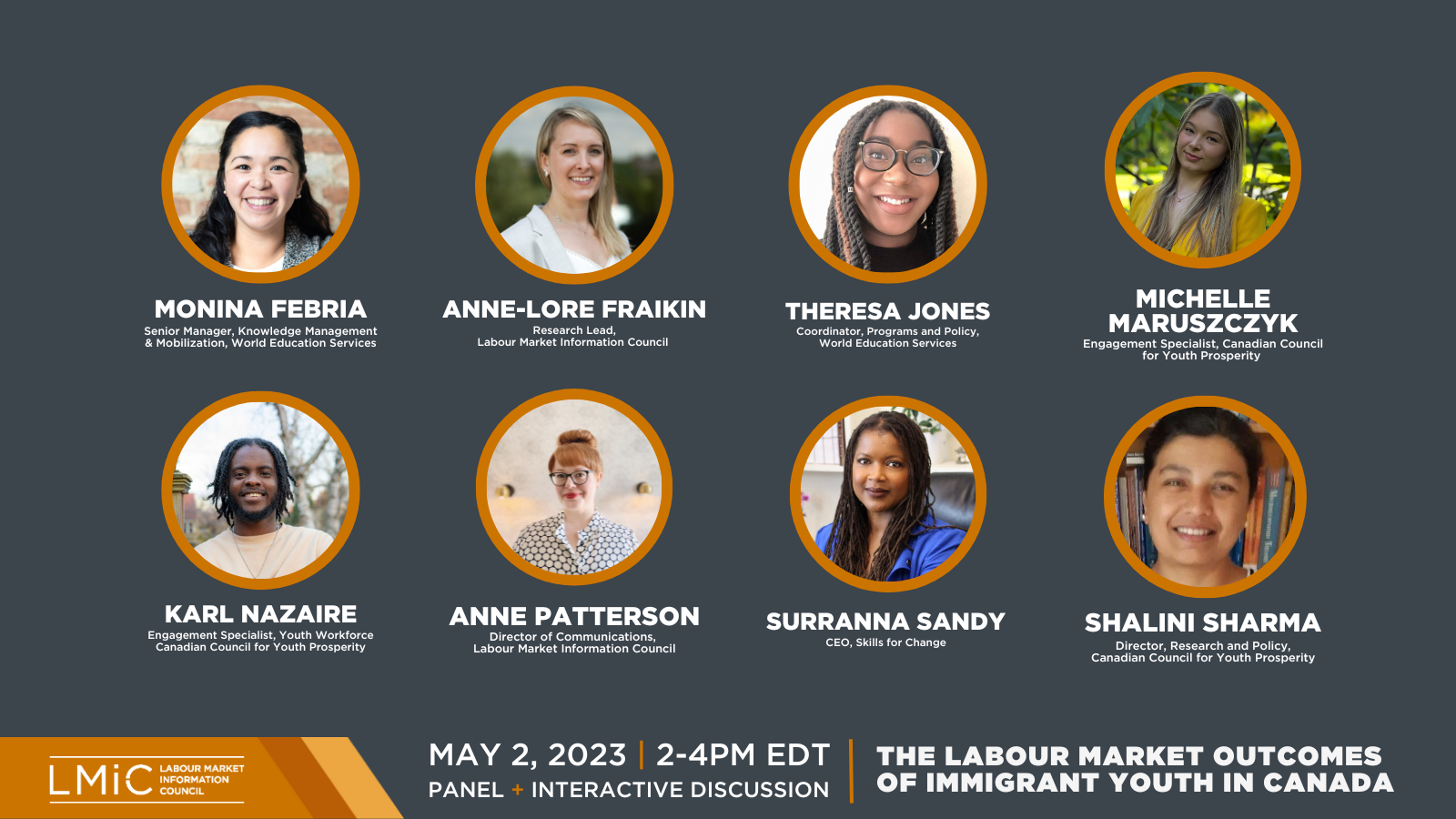
Event recording and transcript: The labour market outcomes of immigrant youth in Canada
Go directly to:
Event summary
On May 2, 2023 LMIC hosted a panel and discussion about the experience of newcomer and immigrant youth in Canada’s labour market, featuring youth, researchers, and career service providers.
Building on the findings in the LMIC and Canadian Council for Youth Prosperity (CCYP) report, Labour Market Outcomes of Immigrant Youth: Impact of the COVID-19 Pandemic, as well as the findings in the World Education Services (WES) report, Going the Distance: Immigrant Youth in Canada’s Labour Market, the event featured a panel discussion moderated by Karl Nazaire of CCYP, and breakout discussions with the economists and researchers behind the reports.
Speakers included:
Breakout room discussions were hosted by:
Thank you to the Canadian Council for Youth Prosperity (CCYP) and World Education Services (WES) for their partnership in this event.
A recording and transcript of the panel portion of the event are available below.
Event recording
Meet our speakers

Monina Febria
Senior Manager, Knowledge Management & Mobilization, World Education Services (WES)
Monina Febria is the Senior Manager, of Knowledge Management and Mobilization at World Education Services (WES). As a child of immigrants, Monina has witnessed first-hand the challenges newcomers face in Canada. Her work experience and academic background focuses on improving outcomes for immigrants so they can achieve full economic and social inclusion. She has over 15 years' experience in program, research and policy work in the immigration and settlement sector in Canada and internationally.
Anne-Lore Fraikin
Research Lead, Labour Market Information Council (LMIC)
Dr. Anne-Lore Fraikin contributes to the analysis and development of labour market information in Canada. She brings expertise in public policy analysis, microeconomics and microeconometrics, and in labour market, population and public economics.
Anne-Lore holds a joint-PhD in Economics from the United Nations University - Maastricht Economic and Social Research Institute on Innovation and Technology (MERIT) in the Netherlands and Liege University in Belgium, a Master’s in Management Science from Liege University in Belgium, and a Master’s in Public Policy from the United-Nations University in the Netherlands.
Theresa Jones
Policy and Programs Coordinator, World Education Services (WES)
Theresa Jones supports the development of programmatic and policy interventions that facilitate the labour market integration of immigrant communities, including first- and second-generation youth, newcomers, refugees, and international students.
Beyond her work at WES, Theresa was the Vice-President of the Victoria Black Student Network and serves as an Analyst for the G7 Research Group at the Munk School of Global Affairs and Public Policy. She is an alumna of the University of Toronto, and holds an HBA in Political Science, focused in Developmental and Comparative Politics. In addition to her native English, Theresa also speaks French, Spanish, and Portuguese. She has diverse experiences in peer-mentorship and faith-based community leadership and advocacy. Drawing from her areas of expertise, she seeks to empower individuals throughout their educational and professional journeys.
Michelle Maruszczyk
Engagement Specialist, Canadian Council for Youth Prosperity (CCYP)
Michelle Maruszczyk is a passionate advocate for newcomer groups, including international students, immigrants, and refugees. Hailing from Germany with Polish ancestry, Michelle has been actively involved with newcomers from diverse backgrounds. She is currently pursuing a Master of Education and has dedicated her career to working with young people, both inside and outside the classroom, with the goal of making a positive impact on their lives.
As an Engagement Specialist at the Canadian Council for Youth Prosperity (CCYP), Michelle's work focuses on promoting greater youth workforce inclusion by bridging the gap between employers and young people, creating resources to help them navigate their barriers, and championing a more equitable and inclusive workplace environment.
Karl Nazaire
Engagement Specialist - Youth Workforce Consultancy, Canadian Council for Youth Prosperity (CCYP)
Karl Nazaire is a Youth Workforce Engagement Specialist with the Canadian Council for Youth Prospertiy, where he facilitates conversations and creates a welcoming environment for youth from diverse backgrounds. As a Haitian immigrant, Karl has a lifelong goal of creating equitable opportunities for marginalized youth.
Anne M. Patterson
Director of Communications, Labour Market Information Council (LMIC)
Anne leads communications at LMIC, creating accessible experiences that help people engage with the important labour market trends that are shaping our world. Working at the intersection of design, impact, technology, and solving complex social challenges, Anne has a background in communications, multimedia storytelling and digital engagement as a strategist, experience designer, and community builder. She has led communications, partnerships and public affairs initiatives in 25 countries.
Surranna Sandy
CEO, Skills for Change
Since November 2012, Surranna Sandy has held the position of CEO at Skills for Change (SFC), a charity that provides employment, social services, and settlement support to over 16,000 immigrants and refugees across four offices in the Greater Toronto-Hamilton Region each year.
Surranna has a Master of Arts in Leadership and Management (Anglia Ruskin University), an MBA in Human Resources Management, a Hons Bachelor of Arts in Leadership and Management; Post Graduate Diploma in Public Administration and a Certificate in Human Resources Management, Certificate in Strategic Perspectives on Nonprofit Management, a Graduate Certificate in Environmental Policy and International Development and a Diploma in HR Management.
Dr. Shalini Sharma
Director, Research and Policy, Canadian Council for Youth Prosperity (CCYP)
Dr. Shalini Sharma is an Economist with a specialization in urban economics and urban labour markets. As the Director of Research and Policy at CCYP, she focuses on creating and curating research on youth workforce development.
Event transcript
This transcript was automatically generated by our event software. Notice an issue? Please email us at info@lmic-cimt.ca

Anne Patterson, Labour Market Information Council
Event Facilitator
[00:02]
Hello, and welcome everyone. We're just getting started and admitting a few folks from the waiting room, but we'll get things going.
So, welcome to the Labour Market Information Council’s virtual panel and discussion on the labor market outcomes of immigrant youth in Canada. Today's event will be hosted in English only, but a French transcript and captioned recording will be made available on LMIC's website. If you would like to turn on live closed captioning for this event, you can click on the ‘more’ button in the bottom right-hand corner of your Zoom window and select captioning.
I'm Anne Patterson, Director of Communications at LMIC.
I’m joining you today from Ottawa, where I am grateful to live and work as a settler and supporter of landback on the unceded and unsurrendered territory of the Anishinaabe Algonquin Nation. Miigwech.
Today we're hosting a very timely discussion about the experiences of newcomer and immigrant youth in Canada's labour market, featuring youth, researchers, and career service providers.
Today's event builds on the findings in the LMIC and Canadian Council for Youth Prosperity report on the labour market outcomes of immigrant youth, as well as World Education Services’ recent report on immigrant youth in Canada's labour market.
If you haven't yet had an opportunity to read those two reports. My colleague Jade will put the links into the chat.
Thank you, Jade.
So, before we get started, I wanted to take a moment to explain how today's session will work.
So, we'll be kicking things off with a 30-minute panel discussion featuring panelists from World Education Services, Skills for Change, and the Canadian Council for Youth Prosperity, moderated by Karl Nazaire, who is a youth workforce Engagement Specialist with CCYP.
And then around 2:40 Eastern time, we're going to launch three breakout room discussions, where you will have an opportunity to chat about some of the ideas, challenges, and opportunities that came up in the panel discussion.
To start the breakout rooms you'll be randomly assigned to one of three discussions and our hosts will introduce their areas of expertise and kick off a dialogue.
Each breakout room discussion will be open for about 20 minutes, and then you'll be automatically assigned to a new discussion topic for another 20 minutes, and then at the end of the hour, you'll have had an opportunity to participate in all three breakout rooms.
So, our first breakout room will be a discussion about what the data tells us about immigrant youth in Canada's labour market, hosted by LMIC research lead Anne-Lore Fraikin.
Breakout room two will be a discussion about facilitating the inclusion of immigrant and refugee youth, hosted by WES Senior Manager of Knowledge Management and Mobilization, Monina Febria.
And breakout room three will be a discussion featuring the stories and experiences of immigrant youth in Canada, hosted by CCYP Engagement Specialist, Michelle Maruszczyk.
Around 3:45 Eastern, we're all going to come back together into this main room to wrap up this session.
And we do hope you'll be able to join us for this full event, including the three discussion sessions, but in case you can't stay for the whole thing, we will be sharing a recording afterwards.
So, with housekeeping out of the way, I am delighted to welcome our panelists.
So, I'm going to start by introducing our panel moderator, Karl Nazaire.
We’ll get Karl pinned up on the screen with me. Hi, Karl.
So, Karl is a Youth Workforce Engagement Specialist with the Canadian Council for Youth Prosperity, where he facilitates conversations and creates a welcoming environment for youth from diverse backgrounds.
As a Haitian immigrant, Karl has a lifelong goal of creating equitable opportunities for marginalized youth.
So, thank you Karl for joining us, and I will pass it over to you to kick off our panel discussion.

Karl Nazaire, Canadian Council for Youth Prosperity
Moderator
[04:19]
Thank you very much, Anne.
Hello everyone, and thank you Anne and LMIC for convening this discussion today.
I'm Karl Nazaire, an Engagement Specialists at the Canadian Council for Youth Prosperity.
I'm pleased to be here today to moderate this panel discussion about the labour market outcomes of immigrant youth in Canada.
I'll be starting by introducing our panelists, and then we'll jump right into the discussion.
So, joining us today is Surranna Sandy, the CEO of skills for change, which is a charity that provides employment, social services, and settlement support to immigrant and refugee youth in the Greater Toronto Hamilton area. Welcome, Surranna.
Next is Shalini, who is joining us from the Canadian Council for Youth Prosperity, where she's the director of research and policy focused on creating and curating research on youth workforce development. Welcome, Shalini.
Next is Theresa Jones, who is a policy and program coordinator at World Education Services, where she supports program and policy interventions for labour market integration of immigrant communities, including first-and-second-generation youth, newcomers, refugees, and international students. Welcome, Theresa.
And finally, Michelle Maruszcyk, who's an engagement specialist at the Canadian Council for Youth Prosperity, where she promotes greater youth workforce inclusion by bridging the gap between employers and young people, creating resources to help them navigate barriers, and championing more equitable and inclusive workplace environments.
Thank you all for joining us today to talk about immigrant and newcomer youth and the labour market.
I have some questions for each of you here, but before we do that I'd like to open to this panel session by inviting each one of you to speak to your perspectives on the greatest challenges and opportunities facing immigrant youth in Canada's labour market right now.
So Surranna, I would like to start with you.
Based on your experience leading Skills for Change, an organization that supports immigrant and newcomer youth, what do you see as the greatest challenges and opportunities facing youth and the labor market integration for youth right now?

Surranna Sandy, Skills for Change
Panelist
[06:22]
Thank you, Karl. And thank you LMIC for putting this event together.
And as Anne said earlier, please check out the research report. It’s some really good information that shows some of the gains that are made, positive gains that have been made for newcomer youth post-pandemic –as we know it.
But Karl that is a really great question.
I've been here at Skills for Change as a CEO for the past 10 years. And as you mentioned, we support immigrants. And in particular, well, we have groups –team members, that have worked directly with immigrant and newcomer youth. And we have observed several challenges, and there's also great opportunities facing labour –that impact labour market integration rates of these groups of youth, especially racialized, immigrant, newcomer youth over the last little while and especially as a result of the pandemic.
One of the significant challenges we've seen among our youth program cohorts at Skills for Change is a lack of confidence, particularly among those who come from low income backgrounds, and are racialized or newcomers. This lack of confidence can be a significant barrier to labor market entry, you know, when they're seeking employment.
And it can really make it challenging for you to present themselves effectively in interviews and or networking events. So, we really have to develop programs and services that are responsive to that.
Another challenge that you know, this particular group faces, is access to post-secondary education which can be prohibitively expensive and difficult for that group to retain.
This is especially true for those who come from low-income backgrounds or racialized, where systemic barriers can make it even more challenging for them to access education and training programs, and to thrive is in those environments.
We have a black youth in STEM project, and one of the challenges we've had is where some of the cohorts or the mentors talked about making that transition from low-income communities, to going on campus, and lacking the tools and resources to be resilient and navigate the spaces that others, who grew up with different opportunities, were able to transition effectively.
So at Skills for Change, we understand the importance of mentorship for youth and have created programs to connect them with mentors and employers. And these mentorship programs help these immigrants racialize you to build the confidence, develop your skills, and build networks that can help them secure meaningful employment.
And so by connecting all your clients with employers, we also aim to provide opportunities for them to gain that work experience and critically develop skills that can help them succeed in the labour market.
But despite these efforts, you know, racialized youth –they still face significant challenges that could be related to unconscious bias, outright racism, and discrimination. And that can limit their opportunities and continue to perpetuate inequities.
So, it is really crucial for employers, policymakers, us in the non-profit space who are doing career development and career management services, to work to address the systemic issues and to work to create more equitable and inclusive workforces.
This would include promoting diversity and inclusion in the workplace, implementing anti discrimination policies, and creating and providing equal opportunities for all individual youth to succeed.
So, there are several opportunities that could potentially improve labour market integration of youth, and some of that includes increasing focus on digitalization and technology. Because it presents and creates opportunities for youth who often more comfortable with technology, and possess those digital skills, to enter the labour market.
I think it's great that we see the growing emphasis on sustainability and the green economy, which could really provide opportunities for youth in renewable energies and environmentally friendly industry. So those are opportunities that we can see being available.
We don't want to discount the, you know, the trend that has started in the pandemic to more and more remote work and flexible work arrangement, because it could benefit youth as they are often more mobile and adaptable than older workers.
So, the rise of the gig economy, even though it has challenges, it also provide more opportunities for youth to enter the workforce on their own terms. So, those are really good opportunities.
And finally, there is an increase, you know, we could recognize the importance of skills training and education for youth. That's an opportunity for governments and employers to invest in training and upskilling programs, the programs that can prepare youth for those jobs for the future, for future of work and increase their competitiveness in the labour market.
So as the research has shown, great strides were made, but there are many opportunities, and they showed opportunities, for youth to succeed in the labour market. But it does require a dedicated concerted effort from all stakeholders who are working to create an environment where all youth have an equal chance to thrive.
And here at Skills for Change, we feel that we play a really vital role in providing the kind of support and resources to newcomer and racialized youth and in connecting them with opportunities for them to succeed.

Karl Nazaire, Canadian Council for Youth Prosperity
Moderator
[11:34]
Thank you very much Surranna.
As an immigrant, I can definitely relate to the fear aspect of mentorship, and job applications, and everything that comes with that. So, I definitely appreciate your input. I think representation is very important in terms of battling against that. So, thank you!
Theresa, I'm very curious about your perspective on this as someone who works on the policy and program side of things. What do you see as the greatest labour market challenges and opportunities facing immigrant and newcomer youth?

Theresa Jones, World Education Services
Panelist
[12:05]
Thank you very much for the question, Karl.
So, there are many ways to go about answering this. However, I will focus my response to a few key challenge areas, and I'll begin with access to settlement and integration supports.
So, there are a number of programs and services that are available across Canada, and our government spends approximately $1.7 billion dollars in funding for these supports. However, I think that it becomes more complex when accessing these services. So, for many youth, they may lack the awareness that these programmings are available. And so also just making sure that there is more coordination within the sector to amplify these efforts.
Depending on where you are settling across the country, so for youth that are going into more rural or smaller communities, there may be a lack of cultural affinity for them and culturally competent supports that are available for these youth.
I would also say for the time of arrival, for more recent immigrants, they're more likely to access these critical supports within their first one to five years of being settled. But then as they are progressing throughout their journey in Canada, they still might need support, but it's not as readily available for them.
I would say language learning supports for example. Even though these youth are attending school, they may be matched into academic programming that may be based on their level of language and not necessarily their competency or intellectual potential. But they are put into these programs that might be limiting, in terms of them accessing the support that they need to learn and function in official languages.
I will also say that for the settlement and integration supports that are available for many youth, they are outside of the core working age population. So, let's say if you're less than 25, there's less likely, or less availability of supports that are targeted towards career development for youth that are trying to facilitate their school to work transition between their later high school years, and then going on into university.
Another issue or challenge area that I would say for immigrant youth, could be like, the lack of social capital.
So, when you are coming to the country and you are, as a newcomer, functioning in society, you're often doing things from scratch. And for youth that are arriving here, or maybe are second gen that have parents that are also working towards establishing their base or having somewhat of a safety net in the country, it is difficult to try and navigate that on your own.
And so with limited support, and having friends, making friends at school, or having those connections that can help facilitate your entry into the workforce and having equitable work, for example, that could be something that's extremely difficult to have, and it does impact your opportunity to be able to function fully in the labour market.
Yeah, so as I mentioned before, towards like a limited awareness or information provision that the supports are available for youth, that's another challenge as it pertains to social capital as well.
And then I think Surranna had also touched on this in her in her responses as well, and that's bias and discrimination in the labour market.
So one area that we have we discovered in our research for the report, for example, was the lack of recognition of international credentials or those that are earned abroad. So for many youth coming into Canada, not having that recognition of non-Canadian work experience or educational experience is something that does present a barrier for entering the labour market and obtaining success.
So then this would then push youth into just having more of these ‘survival jobs’ that are tend to be more low skilled or low wage just to make it by and to get that foot in the door, that first experience. But that creates more of a habit, or more of a system in which they're put into these more precarious job opportunities that have limited growth career wise, and then also as mentioned by Surranna, that that bias that comes from the racial or ethnic background, as well as accents, things like that, zoning area of which they live, things like that, bias that would reduce their opportunity to develop their skills going into the workforce.
So while these remain pressing challenges, I think that there is great work underway and it's integral that we continue to leverage and expand these opportunities to ensure that immigrant youth, that they are they're increasingly able to succeed in Canada's labour market.
So some of these opportunities include listening to and co-creating with youth, so engaging with youth throughout the decision making process, and towards the development of program and policy interventions that are responsive to their needs. So it's important that youth are not only granted ‘a seat at the table’, but that they're enabled to help set it right. So youth are brimming with ideas, and they can and should be consulted as experts as it pertains to their needs, and solutions that would help support them.
And they should be compensated for their time and expertise, right. I also think that this involves investing in implementing specific programming and initiatives, such as work integrated learning opportunities, so that's there’s additional career support. And then these are opportunities that would enable them to build their social capital, expand their networks, and get their foot in the door for additional opportunities; and this will help them provide more of a cushion of safety net throughout their school-to-work transition. And we should also work intentionally, as Surranna had mentioned, working intentionally towards reducing bias against, for example non-Canadian work experience, and also discriminatory practices within the workplace as well.
I also think that there's an opportunity here for us to click conduct and collect further research. You know, we understand through research and potentially lived experience, as we have on the panel here, that the pandemic signalled many career scarring socio-economic impacts, some of which you'll hear more about as we get into the breakout rooms where my colleagues will share a report findings.
So, I think this it's important for us to be able to access and collect this disaggregated data to see the true impact across the immigrant youth demographic, and I think this is a great step in towards identifying gaps and developing strategies to help address these concerns.

Karl Nazaire, Canadian Council for Youth Prosperity
Moderator
[18:31]
Thank you, Theresa.
I like the point that you made with the English-speaking part, because I myself moved here when I was 14 and I failed my English literacy tests in grade 10. But, like when I speak to people now, they never they're never able to tell if I'm either born here or born in Haiti, so it's surprising to them, but thank you. I like that.
Shalini, I'd like to ask you a question next. As a researcher and economist, what challenges and opportunities do you see newcomer and immigrant youth facing in the labour market today?

Dr. Shalini Sharma, Canadian Council for Youth Prosperity
Panelist
[19:03]
Well, thank you for that kind introduction, Karl, and before I start of course, thanks for inviting me here, LMIC team. And of course, it was a real pleasure to collaborate with Anne-Lore, so thank you to her as a great collaborator, and of course, to my fellow panelists as well for being here today.
So, to answer your question, the key concern in here (the report) or the key challenge that immigrant youth face is the challenge of timing of arrival into Canada. Because we have research that shows that, you know the bulk of immigrant youth who’ve come as children, you know at school age levels, they have actually had good, positive, strong outcomes, employment outcomes on par with Canadian born youth, but the later you arrive the harder it gets. And that's not brain surgery, right? Because it takes longer and longer for you to acquire, you know, the skills and adjust to a new school system for that matter and things like that.
So, the research has shown that that, you know, immigrant youth –established immigrant youth who arrived 10 years or more or before that, have actually into adulthood been able to get some pretty strong employment outcomes. And of course, it gets harder as you can come in older and older into the country. So that's the first thing, which obviously suggests that there must be improvement in immigrant settlement services, those that actually catch the people who fall between the cracks, because so far immigrants settlement sort of is geared towards family adjustment, but you do have, you know, an age group between the ages of 19 through 25 or 19 through 29. That requires some specialized sort of networking capabilities and things like that. So that's where the opportunity sort of lies in this case.
So it's the timing or right of arrival that matters, that poses the challenge to immigrant youth in terms of adjustment to the labour market, and that's there's a lot of research to show that this is the case.
The other big issue is of course, lower labour market participation rates then compared to Canadian born youths. And that has been historically true, because, not really that surprising, because immigrant youth tend to pursue education at much higher rates than Canadian born youth have historically done. Okay, that's changing of course, because employment rates have been rising for immigrant youth, especially during the pandemic. And we did see some pretty strong you know, growth areas, so you did see a spurt in immigrant employment growth in high wage sectors, like professional services, you know, but you also saw a high employment growth in low wage sectors like accommodation and food services or warehousing and transportation.
So your Uber drivers, your Amazon delivery drivers, your DoorDash delivery drivers, people working in McDonald's, that is the low wage trap, that is concerning. So, you can only mitigate that through skills and education, training. And there are some challenges with that.
I believe I had two minutes to read to do this. So, I'm going to like, “my stop clock is gonna go”, so I'm gonna stop right here. But as an economist, of course, we look at longer, larger trends and that's where I can speak to it. And we can come back to this point again, I’ll let Michelle go on for now.

Karl Nazaire, Canadian Council for Youth Prosperity
Moderator
[22:30]
Thank you, Shalini.
The point that you made about the timing is very important. I came here at 14 and struggled all throughout high school, as opposed to my sister who came here at nine years old. And now she's in university for biomedical engineering. So there is there is a bit of a—

Dr. Shalini Sharma, Canadian Council for Youth Prosperity
Panelist
[22:47]
Timing is a big thing. Yes.

Karl Nazaire, Canadian Council for Youth Prosperity
Moderator
[22:50]
Yeah, for sure. For sure.
Michelle, I will ask you the next question.
I look forward to hearing your perspective on this as someone who promotes youth workforce inclusion: What challenges and opportunities do you see newcomer and immigrant youth facing in the labour market today?

Michelle Maruszczyk, Canadian Council for Youth Prosperity
Panelist
[23:05]
Yeah, sure. Thanks for the question. Also, thank you for having me here.
I guess I'm the youth perspective to the data of the research report in this panel. So based on my experience, not only as a second-generation immigrant back home in Germany, but also as a recent newcomer here and having worked with refugee as well in the past, I have seen people struggle with different barriers, and I've experienced some of them myself.
A lot of it has been actually picked up on the report. So, I very much see myself reflected in it. One major thing which I saw recurring was, for example, language barrier, as you mentioned Karl, even yourself, but sometimes it's not even speaking about target language. Even if we go specifically, into the specifics, as in being fluent in the target language. Sometimes it's also just the professional jargon you're not acquainted to. Maybe I would know what you're talking about in my mother tongue, but just on the professional level, I might lack some vocabulary, which just simply takes time to, to just grasp on and kind of get yourself into.
Then, of course we already mentioned this as well, credential recognition. Another major aspect of that, probably to those immigrant youth who have already, let's say, are the older range of youth and who have already completed part of the education or professional development, where the credentials or work experiences is not recognized. I've heard the stories, for example from my mother, going through it as an immigrant youth to Germany where she had to go somewhere and work in a completely different fields of study. And even I, myself, when I came here with my German degree, I could not actually work in the field of study that I studied for multiple years. So that's something I even personally see with the issues of credential recognition there.
And of course, kind of adds on to it if you come in especially later, is the lack of network. Whether it's the social network, or even the professional network.
When I came here, I barely knew anyone, considering my only experience here was studying abroad for a matter of four months, and that has been six years back. So those connections already broke off naturally. And of course, professionally, since I don't have any Canadian work experience. I came here with no professional network, which then also puts up a barrier when you apply for jobs with references; because just as a side note or side fact, back home in Germany it's not a standard procedure to put references on your application. And when I even applied for volunteer opportunities, I was asked for professional references. I struggled with that just merely because of the fact I didn't have the network.
So I was just like, great, now I have to try to find any sort of opportunities to engage with people to just create a network from the ground up, to then just apply for jobs afterwards. And all of this, I see, it leads to qualified people working in in jobs that don't match their experience, which Shalini also mentioned this this ‘trap’. I saw people with double master's degrees and working in your local gym, just simply to start off their employment here in Canada.
And of course, what's Surranna also said, cultural differences, bias and discrimination. It can go as extreme as discrimination. For myself, I can call myself lucky and privileged that I did not experience discrimination personally myself, but there is still cultural differences. As minor as there are, you would think Canada and Germany, there’s not a big difference. But let's say to just illustrate it. For instance, I was brought up very much in German directness, being straight to the point, avoiding any sort of unnecessary small talk, because we're very quite straightforward in types of communication and although it's just a minor communication concern, it has some sort of effect on how people perceive you as a person and professionally as most personally. It's just something to accustom yourself to, to just ask people how they're doing, as funny as it sounds, but back home, it's not a standard practice to just ask someone how they're doing on a daily basis or start off your emails like that. It's just across all communication channels, just some like really minor thing, which still sticks to me till this day, and I sometimes have to remind myself till this day.
And as for opportunities, although there's a lot of negative aspects, I see opportunities in predominantly, I guess, entrepreneurship, mentorship and intercultural learning, I guess. That's my own take on it. When the system, well the traditional job market doesn't really serve you in favour, It motivates you to find your own way. So, I saw also a lot of immigrant youth who came here and started off their own businesses, which may or may not be influenced by the facts of how the system is treating them, but I saw a lot of immigrants, at least here and also on the East Coast, open up their own businesses successfully.
And at last, I guess, mentorship and intercultural learning. Immigrants, I would like to pride myself I guess and maybe Karl as well –anyone who has immigrated to a different country brings a lot of resilience because they had to go through their own personal struggles, each on a very individual level, but immigration is a big thing, to just shift countries, leave your family and friends behind, and kind of step and put a new step into a country. So, this resilience and experience they're also just as valuable as the mentorship you can get from professionals here in Canada. So it's very much a two way opportunity for people to learn from one another both professionally, as well as maybe also some of the soft skills. It's just an opportunity for learning and growth. Yeah, both professionally and personally. So I would just probably sum up the challenges and opportunities as in what has been pretty much brought up in the report as credential recognition, language, network mostly, discrimination and then yet again this exchange, this interpersonal level, we can get into as an opportunity for both.

Karl Nazaire, Canadian Council for Youth Prosperity
Moderator
[29:00]
Thank you, Michelle. I like your perspective. And I like everyone else's perspective on this as well.
Thank you all. This was a great way to frame our discussion today.
Shalini. I'd like to turn to you for this next question. I wonder if you could speak to the important, sorry, I wonder if you could speak to the different experiences of immigrant youth in Canada versus other groups like established immigrants or students here on study permits? How different are these experiences and why do they exist?

Dr. Shalini Sharma, Canadian Council for Youth Prosperity
Panelist
[22:47]
Thank you, Karl. That's a good question.
And let me just start off by saying that the experience are naturally different, differences – excuse me I'm blathering. Experiences are already quite different for each of these groups because they are different by definition, you know, they have different things defining each and every one of them.
So to clarify that a little further. Established immigrants are usually those who've been here –immigrant youth, since we're focusing on immigrant youth, established immigrant youth have been here 10 years or longer. Okay. So they likely came as children. It's the bulk of them came as children, most of them came as children. So it's likely that their parents are the ones who had suffered what we call in the literature, a negative entry effect, which basically means that when you enter the country, your earnings and employment takes a huge hit, you know, compared to the native born.
So you basically have a depressed employment income for a pretty long time until it sort of assimilates over like 15 years, 20 years, but what's been happening, we've been seeing in the data, that time has been taking longer and longer because the negative entry effect for each successive cohort has been becoming bigger and bigger. So people are taking longer and longer and longer for their wages to really take off. So this negative entry effect was likely felt more by the parents of established immigrants who experienced this over qualification.
I mean, you've heard of stories of, you know, there was a rocket scientist from China was flipping burgers on Young Street. You know, it was before, you know, it was from the 90s, you know, and we learned about those sorts of stories. So there's this overqualification issue that's far more valid for older immigrants than it is for immigrant youth. But that's because I'm talking about established immigrants. Okay.
When we're talking about newer and, you know, older and older cohorts of immigrant youth who are coming in as teens and as older, that's when they're facing a lot of problems, you know, where they do take this –have this negative entry effect coming into operation, which is why I alluded to sort of, you know, an improvement in settlement services for them, increasing the safety net for these recent newcomer immigrant youth. Okay. But there's also education and skills training that can mitigate that to great extent, and it does.
But herein lies the catch, and that's the problem that we saw in the data when we worked on the report. That while employment rates during the pandemic for immigrant youth, including newcomer immigrant youth, you know, increased and improved, okay, so they were engaging more in the labour market, they were finding employment more, at the same time they’re participation in education, rather than attendance at school, was falling. Okay. So that is the troubling aspect. They're working more but they're studying less. And we didn't see that effect with Canadian born youth, Canadian born youth, it was more or less steady. In fact, enrollment actually increased during the pandemic, okay? So they're steadily acquiring skills, you know, whereas this pool of labour immigrant youth, especially newcomer immigrant youth, are having greater and greater hardship. we are worried about for example, those school attendance rates falling.
That is –that is something that you know, we don't know whether it is just a one off or whether it is a trend so that's the other thing, okay, let's just put an asterix on that.
But if we were to extend that logic or that, that finding to another group of students, you know, international students who are here on temporary permits, they are here to study, okay, then it becomes even more troubling, because what has happened over the last, you know, 20 years since 2000 actually, you will see three/four filing of international students has sort of hit the roof, it's really, really increased, they're participating in the labour market in a huge way. Okay. And that is the problem, because a lot of them also are coming from non-University/College background. So why is that a problem? Because they might likely be stuck in that precisely that low wage trap that I was talking about earlier. Okay.
So then, of course, we need a question, but what are we doing with our immigration policy? Our two-step immigration policy. Recently, for example, we know that the Government of Canada lifted the 20-hour limit for international students so that they could work off campus. Now, that's a great idea in the short run because it means that they're participating more in the labour market, they've satisfied Canadian labour deficits, you know, in several sectors quite much more. But there are long term implications, because it basically means that they will take longer to get educated and longer to assimilate in the labour market in the long run.
So there are long run sort of effects that are not very good, you know, and so these are real problems with these various pools of labour, established immigrant youth, recent immigrant youth and international students that we need to be aware of, and we really do need to talk about this.
I'll stop right here. Thank you.

Karl Nazaire, Canadian Council for Youth Prosperity
Moderator
[34:35]
Thank you Shalini, that is extremely interesting.
Next, I would like to ask Theresa: We've already heard a little bit about resiliency in youth. How would you define resiliency as it relates to immigrant youth in the labour force, and how can we better support their resiliency?

Theresa Jones, World Education Services
Panelist
[34:54]
Thanks so much, Karl, for that question.
So immigrant youth, they are an integral piece of Canada’s emerging workforce. So in light of the challenges that we've gotten a chance to kind of talk through at the beginning, and we've also heard some from Shalini as well and you'll hear a lot more in the breakout rooms later on, the story of immigrant and refugee youth here in Canada is one of tremendous resilience.
So we can talk about it from the perspective of their ability to navigate the labour market and experience higher rates of educational attainment, as we've heard, like youth are attending post-secondary education, they are attaining higher levels of educational attainment, but at the same time, they are facing more difficulty when it comes to latching on to the labour market later on. And we've seen that this kind of has resulted or been–additional strain has been placed on this throughout the pandemic across a range of metrics.
So we see that even at this time, they are navigating the labour market at a time of chronic labour shortages and skill shortage shortages. There has been the transition to remote work and online learning, and I would say that the environment is very unpredictable and also a little bit volatile, but at the same time, they are navigating all of these rapidly changing environments and circumstances and they're able to work towards building a more solid foundation for them that facilitates their success. So they are still making strides towards building their social capital, expanding their networks, ensuring that they have the supports available for them to be successful. Right? They are doing this amongst being able to support their families, both in Canada and abroad, with different commitments that they have. And we see also that they are making strides in the area of representation, as referenced earlier, and advocacy. Right?
Karl, both you and Michelle are here, sharing more of your experience as it pertains to being youth who have immigrated to Canada and sharing your experiences and being able to use that as a tool for advocacy. And I think that in recognizing these experiences and amplifying them, this is the way in which we're able to further support youth in building their resiliency.
So I would also move on to say, that supporting youth in their resiliency means equipping them with the future-proof opportunities and skills that they can leverage throughout labour market transformations, as we've recently seen with the pandemic and beyond. So as we move towards the recovery post-pandemic, we should be able to add more investments into career development support–maintaining and amplifying current efforts. I know that across the immigration sector, as well as different advocacy spaces and research, there is somewhat of a silo effect –in that there are a lot of great initiatives that are happening across different sectors, but we're not always aware of them even when working within them. So being able to break down these silos and further coordinate and engage with each other, as we're doing on this platform, we have a couple of organizations that are represented here and so this is a great, a great way to showcase the way to work together towards the common goal of supporting immigrant youth long term. I’d also say opening doors for youth. So as I mentioned earlier about engaging with youth throughout the decision making process, having them a part of the discussion, helping them frame the discussion towards solutions. I will also say that this is investing in further opportunities for them to share their expertise.
And then I would also say that we work more intentionally towards addressing barriers that are faced by youth and these are across the many different areas that we've that we've spoken about previously. So that's what I'm kind of thinking towards resiliency as it pertains to immigrant youth.

Karl Nazaire, Canadian Council for Youth Prosperity
Moderator
[38:46]
Thank you, Theresa. This is also a great segue into my next question for Surranna.
Surranna, there's a lot of talk about how a resilient economy is a green economy and there seems to be a great deal of opportunity there for youth. What are some potential pathways for immigrant youth in Canada's green economy? And how can they be supported to pursue those opportunities?

Surranna Sandy, Skills for Change
Panelist
[39:05]
Thank you. I'm just sitting here in awe of my colleagues on the panel –learning so much. So thank you for putting together such a great panel.
So the green economy in Canada really does bring lots of potential pathways for immigrant youth, especially as the demand for skilled workers in sectors such as renewable energy, clean technology, and as energy and efficiency increases your opportunities for you to really pursue careers in these fields. And here for example at Skills for Change, we’ve over the years had a youth greening project that we now got funding from the TD Ready Commitment fund, so they provided us with a million dollars to launch across five localities in Toronto a Youth Climate Action Program, and also you know, funding from the provincial government to do a STEM program for black and racialized youth.
So this allows Skills for Change and our team to help to support new career pathways, identification and training in a zero –in the trade sector for our clients. And we focus on immigrant, newcomer and racialized youth to prepare them for these opportunities. What's really great is, this project –Youth Climate Action Project— is youth lead. We're going to work with 200 youth over the next year to develop climate project –projects that focus on tackling climate change and building resilient communities. That also would also provide them with a true skills development and career management to identify professional development and training and career pathways in the green sector. So that's really critical.
Another important thing is that micro-skilling and career pathway programs need to be developed broadly, because they are crucial in providing young people with the skills and knowledge they would need to identify and access and prepare themselves for opportunities in the green economy. So through our project, for example, Youth Climate Action project and our STEM projects, we’re providing really targeted training in specific areas such as you know, energy efficiency, sustainable business practices, so that we can ensure that the young people are well prepared to meet the demands of the very rapidly evolving green sector. And these micro-skilling and career pathway programs are really critical for immigrant youth to –for them to know that these opportunities exist in the green economy, because it'll help them to develop those skills they need to succeed in the industry and to provide the guidance on the steps they need to take to advance their careers.
So one of those most really exciting aspects of the green economy, which is that allows opportunity creation for young, racialized, newcomer, immigrant folks, is especially those with STEM skills to you know, as mentioned, you know, by my fellow panelists, there’re newcomers who come in with international education already in science and technology that can really help to play a critical role in developing and implementing innovative solutions to address climate change through new projects, products and solutions they can develop. We can also guide these racialized youth and newcomer youth to be young entrepreneurs in a green space to help create sustainable business that are aimed at addressing environmental challenges and that can generate, you know, create economic opportunities from for them and others.
And so by supporting them through these targeted training and mentorship, I mentioned mentorship already but it's so critical, we can help them bring the ideas to fruition and they can, you know, at the same time really make impactful impact on the world working in the green space, but we have to support them. So in order to support immigrant youth to take advantage of opportunities in the green economy, It's really essential to provide them with access to the education and training that will prepare them. I talked about mentorship earlier, but networking programs that connect these young folks with industry professionals can help them get insights into the industry, make those connections and acts/creates greater access to potential career pathways.
But we still have to address the systemic barriers that may prevent those immigrant youth from accessing those opportunities. We've talked about it, we have to keep talking about it, but discrimination and lack of access to resources are there. They're there, they remain there. We have to address these barriers to ensure that all young people have a chance to succeed in Canada's green economy. So some of these barriers could also include restrictive gender norms, right? Which can prevent young people from seeking green jobs and structural these— there’re structural gaps, there’re roadblocks, including lack of supportive services or lack of finance or collateral for accessing loans to, you know, move the ideas for a green solution or tool or product forward.
The other thing is a majority of the jobs creating a green transition expected to occur in traditionally male dominated technical sectors, which means that we need to take some intentional measures to ensure that women and girls, you know as newcomer women and girls, that young women and girls are not further marginalize in the green economy.
But there are positive things to look forward to right? As more businesses and industries prioritize their sustainability and environmental responsibility, there will be a growing demand for workers who have expertise in green technologies or in renewable energy or sustainable business practices. And this really does present opportunities for young immigrant racialized folks to develop these skills in areas and to become leaders in the emerging green economy. So at Skills for Change, we are committed to supporting young people in pursuing green economies through our Youth Climate Action projects that are geared towards, not just bringing awareness about climate issues, but developing technical and other solutions to help build a more resilient and sustainable future for all; and ensuring that racialized immigrant youth are aware of the opportunities that exist in the green economy, are well prepared to take advantage of those opportunities, and are provided with the tools and skills and the resiliency to be able to forge ahead and be successful in the green economy. So I encourage folks who are on the call or who are you know, young people on the call, who may not have thought about the green economy and net-zero jobs to really explore that, you know, connect to Skills for Change, our org, to look at our projects. And I want to encourage career practitioners who are on the call to really, you know, help direct your clients into this particular path for the training opportunities that exist–jobs that exists—so that they are prepared for the jobs of the future.

Karl Nazaire, Canadian Council for Youth Prosperity
Moderator
[45:47]
Thank you very much, Surranna. That was really interesting.
Next for Michelle, I have a final question for you before we wrap up our panel today and move into discussion groups. As a young professional who's also a newcomer to Canada, what supports and services have you found most helpful in navigating the labour market, and where do you see areas for improvement?

Michelle Maruszczyk, Canadian Council for Youth Prosperity
Panelist
[46:08]
So yeah, maybe as a disclaimer for background since it wasn't advertised in any of the materials, so my experience of support services is very much interconnected of my experience coming here, recently, not as an international student but straight on as a worker, and some of those standard resources such as like universities/international centers were not available to me. So maybe that's another note, because I assume that international students really have the access to like those centers as first spot to connect with as part of the universities. Unfortunately, I didn't have that.
So personally, I found most helpful, were those support services that very much offered one-on-one support. So while it was helpful to find guides on where to look for jobs, how to apply for a job —specifically even how to structure a resume because that's different to like, however, it's structured back home— it was really helpful to have a person to like dissect your application, go into the resume, go into the details, into the descriptions, and help you apply for each job application.
Just because a guide offers you a job application, like an ideal job application or a version of it, but each job application is very unique to your personal experiences, as well as the responsibilities advertised in the job application. So just having that one-on-one support was really helpful.
And while I personally took most of my support and help from people I knew socially and professionally, I coincidentally came across support services and I guess this is what strikes me the most, which very connected to what Theresa said, is there are services but I was not aware of them. Oftentimes, it was due to mere coincidence that I found out about them. And just simply because I was a newcomer I didn't know where to look for them. So it's very much, I'm not sure if it's a marketing strategy, or maybe I don't know, finding other ways of streamlining to raise awareness on those resources. But it was very much the where to find them and not if they’re there, because when I dig deeper and then even through coincidences, I figured out there were those support services, but I just simply just didn't know where to look for them.
I guess, just for instance, to illustrate this matter –might seem funny and odd and it's just like a light laughter here I guess in this context of the panel— we don't have YMCA at home.
So when I was walking past the YMCA here in Halifax, it is a fitness facility and childcare facility. Never in my mind had crossed it that it could have also had employment services, because for me it was just an odd connection having a gym and employment services connected, but turns out YMCA offers employment services which I was not aware of. And I very much just came across this fact through a mutual friend whose friend turned out to be an employee of those services.
So never in my mind would I have had found myself online looking up for YMCA employment services because I just simply didn't have the connection, because I simply never related to the brand of YMCA with employment services. Or even, I came across ISANS, which is the Immigrant Services Association of Nova Scotia, not because I'd read it somewhere, but I saw randomly people who I knew from university back then, from my one semester abroad which I spent here, now suddenly started positions with them.
I'm like, oh, congratulate this person on LinkedIn, for starting a position with ISANS. ISANS, what is that? And then after looking them up I was like, 'Oh, wait, great.' That's something I can look into.
So it's very much what, just again stressing for what Theresa said, the awareness that there is, technically speaking, the resources are there, it's just readily availability and awareness, which I guess is a certain or like maybe a special barrier for those newcomers who come in without any sort of network. So I didn't had an academic network, neither did I have a professional network. So it would have been really much of a help to have a person just sit down with me and have a normal talk, and maybe as part of the conversation I would find out okay, these are the resources, which you can talk to. So it doesn't necessarily require a support service, which gives me already help, but kind of a mediator to forward me and guide me towards those right resources. So I guess I would like to put the stress on mentorship opportunities, just simply because through this mentorship not only can we learn from one another, but even let's say for one barrier which I brought up was references right as part of job applications, maybe if you get a mentor who's of course established in his professional network –that might already give you at least one professional reference, which helps you to start off your job applications with, aside from the fact of navigating this overwhelming space of resources which you don't even know exist.
So I very much stress on mentorship opportunities, or just like mediating –making resources more visible. And if offering services very much put stress on this one-on-one mentorship or one-on-one support as in, review job applications or just, I guess, navigating the new environment because it's not just work in the end. It's a new life you're starting in a new country. So I guess one-on-one support and awareness is the main thing I would like to highlight for this last question.

Karl Nazaire, Canadian Council for Youth Prosperity
Moderator
[51:26]
Thank you, Michelle.
Yeah, those services are really very important. Especially when you come to this country at a later age, as Shalini was saying, that timing is everything as an immigrant. So thank you. I'm so glad to hear your perspective as a newcomer in this dialogue, and I know that we'll have an opportunity to explore this more in the breakout room discussions.
Thank you again, everyone. And thank you Shalini, Theresa, Surranna and Michelle for joining us today. This was a great discussion to kick off the event, and I know that I certainly learned a lot.
I'm going to turn it back over to Anne now, who will tell us all about discussion groups. Thank you.

Anne Patterson, Labour Market Information Council
Event Facilitator
[52:04]
Thank you so much Karl, and thank you to all of our panelists again. We really appreciate this rich discussion about the many opportunities and many barriers for immigrant youth in Canada.
If any of our attendees today have questions for the panelists, we invite you to pop them into the chat and continue the dialogue there. We'll also have an opportunity to speak more about these topics in the breakout rooms we're about to join.
So, here's what's happening next.
In about two minutes, you'll all be automatically assigned by Zoom into one of three discussion groups, where you'll hear a short overview of your discussion host's work and interest areas as it relates to immigrant and newcomer youth in the labour force, and you'll have an opportunity for questions and dialogue.
After 20 minutes, you'll see a countdown timer on your screen that will alert you that you'll be moved into a new discussion group in about one minute. You'll have 20 minutes in that next discussion group, and then that timer is going to happen again, and you'll jump into the third discussion group.
By the end of an hour, you'll have had an opportunity to participate in all three discussions, and we'll return here to the main room to close out our event for the day.
So please give us just a minute while our team moves everyone into their groups and we'll see you shortly.
Hi, everyone, welcome back from your discussions. Thank you so much for joining us today.
I hope you enjoyed the breakout rooms, and apologies for the technical hiccups; we know better for next time.
So on behalf of LMIC, I want to say a big thank you to our moderator, our panelists and our discussion hosts, as well as to see CCYP and WES for their support and engagement in this event.
In just a moment, a very short survey is going to pop up on your screen – It's only a few questions and we're looking for your feedback about your experience today. So, we hope that you will share your thoughts.
Thank you again everyone, and have a lovely afternoon wherever you're joining us from.
---------------------------------------- END TRANSCRIPT ----------------------------------------
This transcript was automatically generated by our event software. Notice an issue? Please email us at info@lmic-cimt.ca